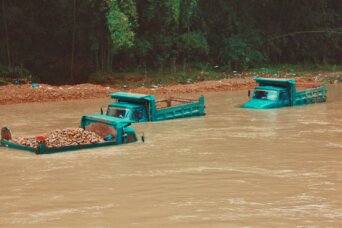- About
- Topics
- Story
- In-Depth
- Picks
- Opinion
- News
- Donate
- Signup for our newsletterOur Editors' Best Picks.Send
Read, Debate: Engage.
| topic: | Climate Change |
|---|---|
| editor: | Bob Koigi |
As global temperatures rise to unprecedented heights, sparking a cocktail of devastating impacts, including floods, heatwaves and wildfires, a new casualty of the human-induced climate change is emerging. Heritage sites in Africa, which are known to have immense cultural, spiritual and scientific value, are under threat of destruction by rising sea levels and erosion.
Experts posit that up to 56 cultural heritage sites across the continent are in the red light of coastal flooding as sea levels continue to rise; this figure is estimated to grow to 190 under medium emissions and 198 under high emissions by 2050 if immediate measures, like building coastal buffers, are not put in place. The researchers further state that even more African countries will have their cultural sites at high risk by 2100.
The Intergovernmental Panel on Climate Change (IPCC) in a report sounded the alarm over rising sea levels in Africa, which have risen at a faster pace than the global average, further complicating the issue.
In a move that points to the growing importance that both science and research are placing on heritage sites, the intergovernmental body of the United Nations has commissioned a white paper that explores the risks of climate change to cultural sites, set to be released in July of this year.
Of greater concern, however, is the danger that the human-caused climate change is posing to the rich culture and heritage that the sites hold. From crucial information that has been passed by generations for centuries, to designs that have inspired numerous and iconic architectural masterpieces world over, the heritage sites remain bastions of our humanity, at least for now.
Governments, policy makers and researchers should therefore - and as a matter of urgency - put in place mechanisms and resources that insulate these gems from erosion while advocating for innovative adaptation mechanisms by local communities in order to protect the historic treasure troves.
Photo by Jéan Béller

